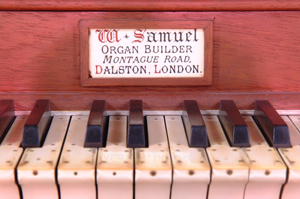 Saturday, 19 October, 9.30, p.m
Saturday, 19 October, 9.30, p.m
Funchal Cathedral
António Esteireiro: organ
Coro Gregoriano de Lisboa: Armando Possante direction
Common of the Dedication of a Church
The ritual of the dedication of a church is one of the most ancient of which there are records, dating back probably to the beginnings of Christianity and invested with great solemnity and significance. This is the Mass sung by the Gregorian Choir of Lisbon, celebrating thereby one more anniversary of the dedication of the altar of Funchal Cathedral (dedicated on 18 October 1517). The sung texts speak of this terrible place as the house of God and the door to Heaven, and will be interspersed with improvised organ commentaries.
The musical tradition of liturgical chant alternating with improvisation continues to be an integral part of the regular musical practice of the main cathedrals, in which the rite and the liturgy are frequently punctuated by musical elements improvised by the organist, appropriate to the symbolism and to the duration of each moment. The inclusion of the liturgical texts in these programme notes permits the enriching of the auditory experience of the listener, allowing the interconnection of possible contextualizations for the various improvisations.
To conclude the concert, we have a transcription of an improvisation recorded by Charles Tournemire, renowned French organist and composer, on the hymn Te Deum. This work is part of a set of five improvisations recorded by Tournemire in 1930 and later transcribed by his pupil Maurice Duruflé (1902-1986). Though it is a transcription of an improvisation rather than an original composition, it has become one of the Tournemire’s mots frequently performed works, not only bearing witness to the liturgical musical practice of the time, but also the source of inspiration for many improvisers to the present day.
António Esteireiro
COMMUNE DEDICATIONIS ECCLESIAE
Proprium of the Dedication of a Church (Gregorian Chant and organ improvisations)
Canto Gregoriano
Introitus (Gen. 28: 17, 22 / Ps. 83, 2-3)
Kyrie XIV
Gradual
Offertorium (I Cr. 29 : 17, 18)
Communio (Mt. 21: 13)
Te deum
Charles Tournemire (1870-1939)
Improvisation sur le Te Deum
INTROITUS (Gen. 28: 17, 22 / Ps. 83, 2-3)
Terribilis est locus iste : hic domus Dei est, et porta cæli : et vocábitur aula Dei.
Quam dilécta tabernácula tua, Dómine virtútum! concupíscit, et déficit ánima mea in átria Dómini. Glória Patri, et Filio, et Spiritui Sancto. Sicut erat in principio, et nunc, et semper, et in saecula saeculorum. Amen. How dreadful is this place! This is none other than God's house, and this is the gate of heaven. and shall be called the court of God.
For, behold, your enemies are stirred up. Those who hate you have lifted up their heads. They conspire with cunning against your people. They plot against your cherished ones. Glory be to the Father, and to the Son, and to the Holy Spirit. As it was in the beginning, is now, and will be forever. Amen
KYRIE XIV
Kyrie eléison.
Christe eléison.
Kyrie eléison Lord, have mercy.
Christ, have mercy.
Lord, have mercy.
GRADUAL
Locus iste a Deo factus est, inæstimábile sacraméntum, irreprehensíbilis est. V/. Deus, cui stat Angelórum chorus, exáudi preces servórum tuórum. This place was made by God a priceless mystery, it is without reproof. V/. O God, before Whom stands the choir of angels, hear the prayers of Thy servants.
OFFERTORIUM (I Cr. 29 : 17, 18)
Domine Deus, in simplicitáte cordis mei lætus óbtuli univérsa; et pópulum tuum, qui repértus est, vidi cum ingénti gáudio : Deus Israel, custódi hanc voluntátem, Domine Deus. O Lord God, in the simplicity of my heart, I have joyfully offered all these things; and I have seen with great joy Thy people, which are present: O God of Israel, keep this will.
COMMUNIO (Mt. 21: 13)
Domus mea, domus oratiónis vocabitur, dicit Dóminus : in ea omnis qui petit, áccipit : et qui quærit, ínvenit : et pulsánti aperiétur. My house shall be called the house of prayer, saith the Lord: every one that asks therein, receives; and he who seeks, finds; and to him who knocks, it shall be opened.
TE DEUM
Te Deum laudamus: te Dominum confitemur.
Te aeternum Patrem omnis terra veneratur.
Tibi omnes Angeli; tibi Caeli et universae Potestates;
Tibi Cherubim et Seraphim incessabili voce proclamant:
Sanctus, Sanctus, Sanctus, Dominus Deus Sabaoth.
Pleni sunt caeli et terra maiestatis gloriae tuae.
Te gloriosus Apostolorum chorus,
Te Prophetarum laudabilis numerus,
Te Martyrum candidatus laudat exercitus.
Te per orbem terrarum sancta confitetur Ecclesia,
Patrem immensae maiestatis:
Venerandum tuum verum et unicum Filium;
Sanctum quoque Paraclitum Spiritum.
Tu Rex gloriae, Christe.
Tu Patris sempiternus es Filius.
Tu ad liberandum suscepturus hominem, non horruisti Virginis uterum.
Tu, devicto mortis aculeo, aperuisti credentibus regna caelorum.
Tu ad dexteram Dei sedes, in gloria Patris.
Iudex crederis esse venturus.
Te ergo quaesumus, tuis famulis subveni: quos pretioso sanguine redemisti.
Aeterna fac cum sanctis tuis in gloria numerari.
Salvum fac populum tuum, Domine, et benedic hereditati tuae.
Et rege eos, et extolle illos usque in aeternum.
Per singulos dies benedicimus te.
Et laudamus nomen tuum in saeculum, et in saeculum saeculi.
Dignare, Domine, die isto sine peccato nos custodire.
Miserere nostri, Domine, miserere nostri.
Fiat misericordia tua, Domine, super nos, quemadmodum speravimus in te.
In te, Domine, speravi: non confundar in aeternum. O God, we praise Thee: we acknowledge Thee to be the Lord.
Everlasting Father, all the earth doth worship Thee.
To Thee all the Angels, the Heavens and all the Powers,
all the Cherubim and Seraphim, unceasingly proclaim:
Holy, Holy, Holy, Lord God of Hosts!
Heaven and earth are full of the Majesty of Thy glory.
The glorious choir of the Apostles,
the wonderful company of Prophets,
the white-robed army of Martyrs, praise Thee.
Holy Church throughout the world doth acknowledge Thee:
the Father of infinite Majesty;
Thy adorable, true and only Son;
and the Holy Spirit, the Comforter.
O Christ, Thou art the King of glory!
Thou art the everlasting Son of the Father.
Thou, having taken it upon Thyself to deliver man, didst not disdain the Virgin's womb.
Thou overcame the sting of death and hast opened to believers the Kingdom of Heaven.
Thou sitest at the right hand of God, in the glory of the Father.
We believe that Thou shalt come to be our Judge.
We beseech Thee, therefore, to help Thy servants whom Thou hast redeemed with Thy Precious Blood.
Make them to be numbered with Thy Saints in everlasting glory.
Save Thy people, O Lord, and bless Thine inheritance!
Govern them, and raise them up forever.
Every day we thank Thee.
And we praise Thy Name forever, yea, forever and ever.
O Lord, deign to keep us from sin this day.
Have mercy on us, O Lord, have mercy on us.
Let Thy mercy, O Lord, be upon us, for we have hoped in Thee.
O Lord, in Thee I have hoped; let me never be put to shame.
Participants
|
Born in Lisbon, he graduated in organ from the Higher School of Music and Theatre in Munich, and in sacred music at the Higher School of Sacred Music in Regensburg (organ and improvisation with Franz Josef Stoiber). He subsequently attended the organ classes of Hans-Ola Ericsson at the Higher School of Music in Bremen. He has given concerts both as a soloist and as a member of various choral and orchestral groups in a number of countries, including Brazil. As well as being a regular guest of the main cycles of organ concerts and festivals in Portugal, he coordinated the Cycles of Organ Concerts at the Basilica of the Martyrs in Lisbon, and the Complete Organ Works of Olivier Messiaen. Professor of Organ at the National Courses of Liturgical Music organized by the Sanctuary of Fátima, he is also a regular collaborator with the Sacred Music Department of the Parish of St Mary in Belém. as part of this collaboration, he is organizing the programming of the first Cycle of Organ Concerts of the Monastery of the Jerónimos. He currently teaches organ and improvisation at the Gregorian Institute and the Higher School of Music in Lisbon. |
|
In your activity, particularly noteworthy are its participations in Lisboa 94 Capital Europeia da Cultura, the Jornadas de Música Antiga at the Gulbenkian Foundation, Concertos de Páscoa of the Casa da Música, national tour on the occasion of the 300th anniversary of the death of Fr António Vieira, Commemoration of the Portuguese Discoveries, the organization of the International Festival of Gregorian Chant of Tomar, the participation in the film Quem és tu by João Botelho, the first performance in Portugal of Messiaen’s Et exspecto resurrectionem mortuorum, with the Orquestra Metropolitana de Lisboa under the direction of Michael Zilm, and the commemorations of the 20th anniversary of the São Roque Music Festival. The Gregorian Choir has performed in a number of countries, such as Japan, Belgium, Luxembourg, Switzerland, Italy and Morocco. Participation in television and radio programmes as “Percursos da Música Portuguesa” for RTP, the Gregorian Choir has recorded five discs: a live recording of the Missa pela Chuva published by EPAL in 1999, and the others issued by Decca: the Liturgy of St Anthony (1993), which received the Choc du Monde de la Musique, Mass for Peace (1997) – awarded the Diapason d'Or, Liturgies of European Saints of the First Millennium (2004) and The Apostles (2011), nominated for the SPA Authors’ prize as the best classical disc. |
|
Armando Possante studied at the Gregorian Institute of Lisbon and at the Higher School of Music in Lisbon, where he completed a Bachelor degree in choral direction and Graduation in Gregorian chant. He studied in Vienna, with Professor Hilde Zadek, and attended master classes in singing with Christianne Eda-Pierre, Christoph Prégardien, Siegfried Jerusalem and Jill Feldman. He also attended courses of Gregorian chant in Italy and Portugal with Nino Albarosa, Johannes Göschl, Alberto Turco and Luigi Agustoni. It is musical director and soloist of Olisipo Vocal Group and Gregorian Choir of Lisbon and having been presented in concerts across Europe, Asia, America and Africa and recorded over a dozen CDs. Won with the Vocal Group Olisipo first four awards and several awards at international competitions for interpretation in Bulgaria, Finland and Italy. Won the 3rd prize in the Iberian Voices, the 3rd prize at the Luisa Todi and the 1st prize in the Interpretation of Estoril. Appeared as a soloist in major works of the repertoire of concert and opera and in opera Così fan Tutte, L'Amore Industrious, The Varieties of Proteus, Dido and Aeneas, The Fairy Queen, Venus and Adonis, La Descente d'Orphée aux Enfers, La Donna di Genius volubile, La Dirindina, Forest, Body and Soul, Jeremy Fisher, The Dream and L'Elisir d'Amore. . |
Notes about the Organ
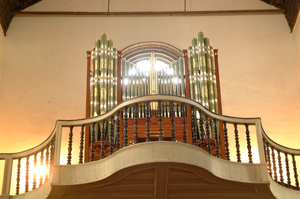 Funchal Cathedral
Funchal Cathedral
At Funchal Cathedral, the presence of an organ can be documented from the very beginning of the 16th century. In 1739 King João V gave the Cathedral a new organ made in Lisbon by the organ builder Francisco do Rego Matos. In 1740 the Chapter had this instrument placed in the original gallery, placed in a recess above the former sacristy, situated to the left of the sanctuary (Ferreira 1963: 18-19). No longer in working order, this organ was dismantled in 1925 and eleven years later given to the Igreja do Colégio. In its place the Cathedral Chapter decided to buy the organ that belonged at that time to the Anglican Church. The minutes of the Chapter meeting of 5 January 1937 mentions “that by order of His Most Illustrious and Most Reverend Lord, the Bishop had bought the present organ belonging to the Anglican Church, the price of which was thirty-four contos and five hundred escudos (34,500 escudos), added to which the cost of transport, reassembly, etc.”, and that it was placed in the choir gallery at the main entrance of the Cathedral. This instrument, much altered since then, was built in England in 1884, having been ordered by an English doctor who resided in Madeira and also played the organ. At a certain point, this doctor had decided to give it to the Anglican Church.
The organ had resulted from the collaboration of various builders, though T. A Samuel (Organ Builder, Montague Road, Dalston-London) was responsible in 1884 for assembly in situ. The pipes – or, rather, some of them – were made by the firm Charles S. Robson (1861), the windchests by Wilson Gunnerson, the manual by the firm S. W. Browne and some of the metal pipes were the work of the company A. Speneir (1884).
Originally using tracker action, some thirty years ago the instrument was considerably altered, with changes made to the mechanism and the addition of a number of reed stops en chamade. These modifications have completely altered the organ’s character, without making any kind of improvement from a musical point of view. As a result of this, and with the intention of endowing the Cathedral with an instrument appropriate for liturgical purposes and for concert work, major restoration to the instrument was undertaken and completed in 1995/96 by Dinarte Machado.
I Manual (C-g’’’)
Open Diapason 8’
Flöte 8’
Holz Bourdon 8’
Principal 4’
Waldflöte 4’
Nazard 2 2/3’
Super Octave 2’
Mixture 1 1/3’ de 4 filas
Dulçaína
Trompette 8’
II Manual (C-g’’’)
Voix Celeste 8’
Gamba 8’
Gedeckt 8’
Principal 4’
Spitzflöte 4’
Octave 2’
Simbala 1’ de 4 filas
Krummhorn 8’
Tremblant
Pedal (C-g’’’)
Subbass 16’
Open Diapason 16’
Octave 8’
Bombarde 16’
Trompette 8’
Acoplamentos / Couplers
I/II
I/Pedal
II/Pedal
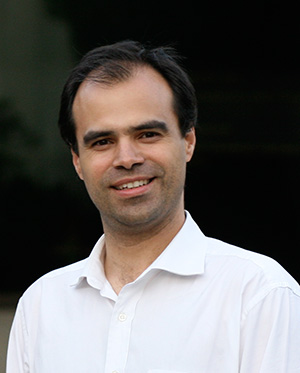 António Esteireiro
António Esteireiro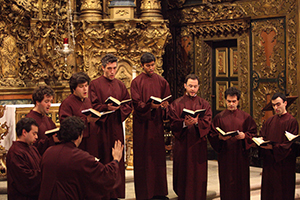 Coro Gregoriano de Lisboa
Coro Gregoriano de Lisboa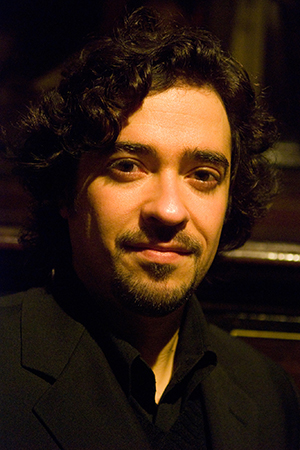 Armando Possante
Armando Possante